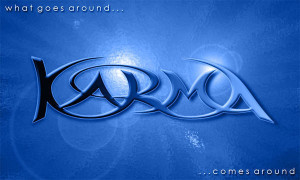
Coincidences are occurrences without prequels. I do not believe such occurrences exist. Rather, I think we simply have forgotten or we are unaware of the prequels to which apparent coincidences are sequels.
Life events are like numbered movies numbered from I to IV or like television serials. They do not arise from nothing. They are populated by unique characters each belonging to a living person whose chance of existence is statistically zero. They are affected by natural forces and by supernatural notions, or by notions that we think are supernatural because we do not understand them.
Coincidences are apparent, not real. Actually according to Hinduism the world itself is an illusion and only God is real. Still, within the illusion or Maya of reality, I cannot believe our lives march forward by mere chance. Things happen as a result of our karma.
Karma works like an arrow which may be stored in a quiver, aimed from a bow, or soar in flight. The arrow’s place in time and space determines where it will strike but it cannot fall unless it has been launched. What happens as a consequence of its landing is not random or coincidental but is an effect caused by the actions of many actors.
See Irina Gajjar’s ideas played out in her works of fiction, New New York 3000 Years Later and The Pokhraj.














